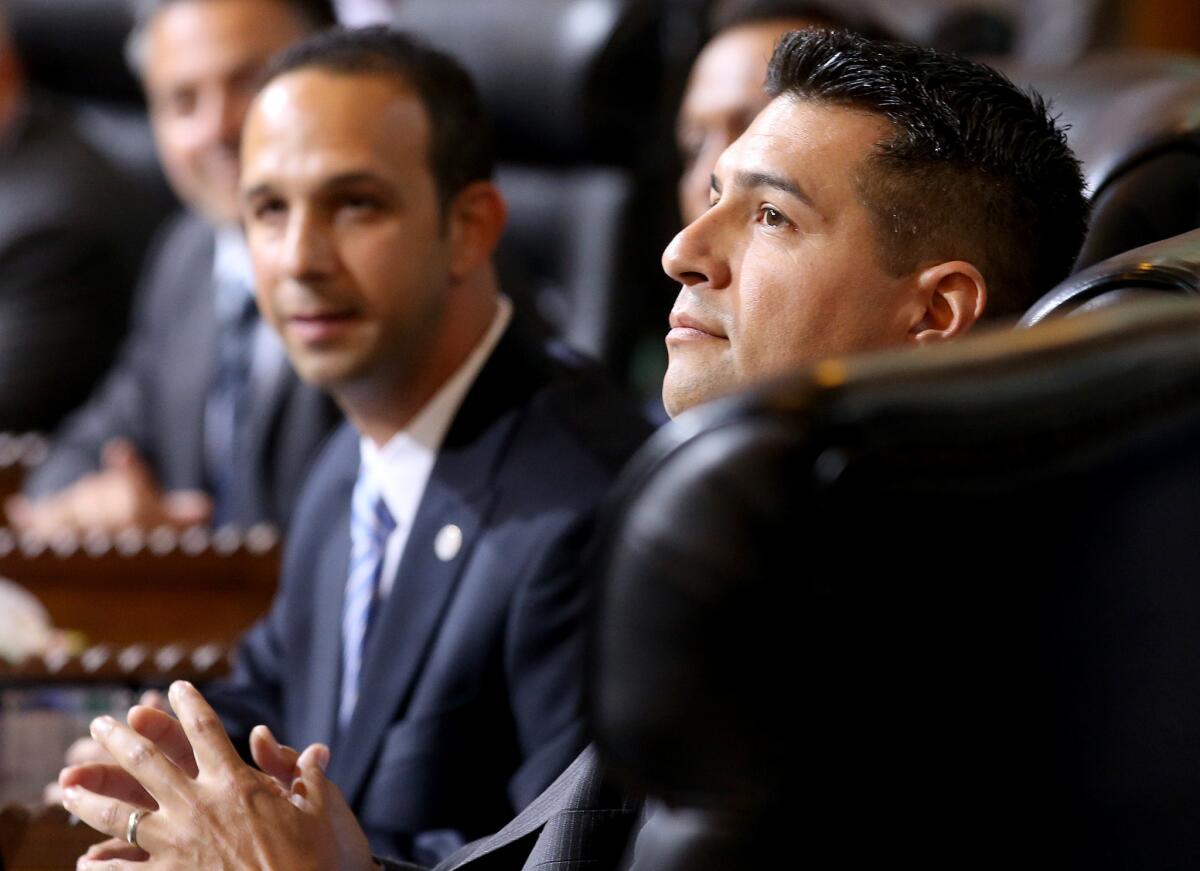L.A. councilman calls for ballot measure to revamp how DWP is governed

Los Angeles City Councilman Felipe Fuentes, right, has called for a ballot measure to change the governance structure of the Department of Water and Power.
- Share via
Los Angeles City Councilman Felipe Fuentes called Friday for a ballot measure to overhaul the way the Department of Water and Power is governed, proposing changes that he argued would empower its board and minimize interference by city politicians.
His proposal comes in the aftermath of a report, prepared by outside consultants, that found that power at the utility is too decentralized and urged the city to put reforms before voters. Critics have repeatedly charged that the way the department is governed is dysfunctional and vulnerable to political meddling.
“No single city entity is responsible for actively managing the utility,” Fuentes said in a statement. The result is that the DWP is “failing the ratepayer.”
Fuentes proposed a ballot measure for this year — possibly as soon as June — that would replace the volunteer board that oversees the utility with paid professionals who would work full time.
The councilman wants the city to authorize the board to hire its own legal and analytical staff to analyze department operations. And the proposal suggests removing city requirements for the mayor and City Council to approve some board actions, including the appointment of a utility chief.
“We cede a lot of control from City Hall, which might not make folks in the building all that happy,” Fuentes said Friday. “But what you get in return is a focused, professional management system in place.”
Mel Levine, president of the utility board, said he applauded Fuentes for bringing the proposal forward. “Reducing interference from political leaders is in the city’s interest,” Levine said.
Right now, “everybody can blame somebody else for what does or doesn’t happen,” Levine said. “It obfuscates the process.”
Utility board members are appointed by the mayor. Fuentes did not specify how the board members would be selected under the new system in his proposal, saying it remained to be discussed.
Jack Humphreville, a member of the Greater Wilshire Neighborhood Council, said he wanted to know more about how the city would check and balance the powers of a professional board.
“What kind of mechanisms do we have to oversee these guys so they’re not going to go rogue on us?” Humphreville asked.
The proposal comes at a time when the utility faces renewed scrutiny, with city lawmakers expected to vote on increasing water and power rates in the coming months.
Fuentes, who heads the council committee that examines DWP and environmental issues, said it would be irresponsible to raise rates without addressing the need for systemic reform. He unveiled his proposal three weeks after announcing he would not run for a second term, a rare decision at City Hall.
Fuentes also proposed two other changes. One of them is to eliminate the civil service system for hiring utility employees to make hiring more efficient.
Sluggish hiring also has been a concern for city ratepayer advocate Fred Pickel, who said he was “cautiously optimistic” about the new proposals.
Pickel, whose position was created by voters to independently scrutinize utility rates, said last year that slow hiring was one of the main causes of the lengthy waits that customers faced after a billing debacle: The department was unable to put enough workers in place to quickly respond to customer complaints.
Brian D’Arcy, who heads the union that represents thousands of utility employees, was still reviewing the proposal Friday, according to his spokesman. Fuentes said his plan would preserve union representation and bargaining rights for employees.
Fuentes is also taking aim at the practice of sending roughly a quarter of a billion dollars annually from the utility to the city general fund, which pays for police, firefighters and other city employees and services. Critics have challenged such transfers in court, arguing that they are a kind of hidden tax increase that sidesteps voter approval.
Fuentes said he wanted to cap the amount of money transferred so that the utility had more money to invest in aging infrastructure. His plan would restrict it to the amount that was transferred before a state proposition went into effect more than five years ago. City officials estimated that would cap the amount at around $230 million annually.
MORE: Get our best stories in your Facebook feed >>
Fuentes’ proposal was seconded by Council President Herb Wesson and Councilman Mitch O’Farrell.
City Controller Ron Galperin said the proposal was “a good first step on the path toward what can become meaningful change at the utility.”
His office released the recent report by outside consultants that urged the city to reform its governance structure. That report found that utility decisions were overseen by multiple layers of city bureaucracy, but none had enough power over the DWP to hold it fully accountable.
In reaction to the proposal, Mayor Eric Garcetti touted his efforts to stabilize and reform the utility, including bringing in a new chief and reducing wait times for customers calling the department.
When asked whether Garcetti backed the proposal, his spokeswoman, Connie Llanos, called it “a great place to start the conversation.”
Follow @latimesemily for what’s happening at Los Angeles City Hall
ALSO
Former Santa Ana city councilman sentenced to a year in jail
More claims filed against San Bernardino County in terror attack
Kia dancing hamster pleads no contest in disability fraud case
More to Read
Sign up for Essential California
The most important California stories and recommendations in your inbox every morning.
You may occasionally receive promotional content from the Los Angeles Times.













